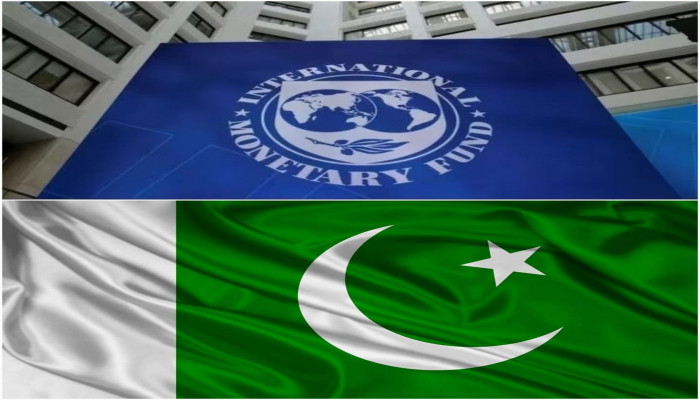IMF grants $2.4 billion financial assistance to Pakistan to stabilise economy under dual programmes
- In Reports
- 10:55 AM, May 10, 2025
- Myind Staff
The International Monetary Fund (IMF) has approved two new funding decisions for Pakistan, releasing a total of about $2.4 billion to support the country’s economic reforms and efforts to strengthen climate resilience. In a meeting held on May 9, the IMF Executive Board conducted its first assessment of Pakistan’s economic reform program under the Extended Fund Facility (EFF). As a result, Pakistan will receive an immediate disbursement of roughly $1 billion, bringing the total funds received under this program to about $2.1 billion.
Additionally, the Board supported Pakistan’s appeal for support through the Resilience and Sustainability Facility (RSF), granting access to approximately $1.4 billion. This funding aims to help Pakistan manage risks related to climate change and natural disasters. Previously, the IMF had approved a 37-month EFF program for Pakistan on September 25, 2024, worth around $7 billion, with an initial $1 billion released at that time. The IMF has now given Pakistan close to $2.1 billion in loans, including the latest $1 billion installment under the Extended Fund Facility (EFF).
The IMF’s Executive Board, which handles its daily operations, consists of 25 Directors chosen by individual countries or groups of countries, along with the Managing Director, who acts as the Board’s Chair. The economic weight of each member determines voting power. The United States holds the most influence and is the most significant contributor, with 16.49% of the total vote. In comparison, India, Bangladesh, Bhutan, and Sri Lanka hold a 3.05% share.
India strongly opposed the IMF’s bailout package for Pakistan but ultimately abstained from voting during the meeting. This is because the IMF’s board rules do not allow a direct vote against a proposal; members can only vote in favour or choose to abstain. At the meeting held on May 9, India voiced its concerns about Pakistan’s track record with previous IMF programs. It raised the risk that the funds could be misused, particularly for supporting state-sponsored cross-border terrorism. These points were highlighted in an official statement by the Ministry of Finance.
“Pakistan has been a prolonged borrower from the IMF, with a very poor track record of implementation and of adherence to the IMF’s program conditions. In the 35 years since 1989, Pakistan has had disbursements from the IMF in 28 years. In the last 5 years, since 2019, there have been 4 IMF programs. Had the previous programs succeeded in putting in place a sound macroeconomic policy environment, Pakistan would not have approached the Fund for yet another bail-out program. India pointed out that such a track record calls into question either the effectiveness of the IMF program designs in the case of Pakistan or their monitoring or their implementation by Pakistan,” a statement from India’s Ministry of Finance.
India warned that supporting ongoing cross-border terrorism sends a harmful signal to the world, puts the credibility of funding groups and donors at risk, and undermines the principles shared by the international community.
“While the concern that fungible inflows from international financial institutions, like the IMF, could be misused for military and state-sponsored cross-border terrorist purposes resonated with several member countries, the IMF response is circumscribed by procedural and technical formalities. This is a serious gap highlighting the urgent need to ensure that moral values are given appropriate consideration in the procedures followed by global financial institutions,” said India’s Ministry of Finance.
The IMF has praised Pakistan for effectively carrying out the reforms under the Extended Fund Facility (EFF), pointing to signs of economic recovery. These include a primary budget surplus of 2% of GDP in the first half of fiscal year 2025, a record low inflation rate of just 0.3% in April, and more substantial foreign exchange reserves, which grew from $9.4 billion in August 2024 to $10.3 billion by the end of April 2025. The reserves are expected to reach $13.9 billion by June. Looking ahead, the key policy goals under the EFF are to maintain strict fiscal discipline, broaden the tax base, reform state-owned enterprises, and improve public services and energy sustainability. The IMF also stressed reducing the economy’s dependence on the public sector to encourage more private investment and lending. In parallel, the Resilience and Sustainability Facility (RSF) will help Pakistan boost its climate resilience. This includes better disaster response systems, more efficient water use, stronger climate risk reporting by financial institutions, and support for the country’s global climate commitments.
“Pakistan has made important progress in restoring macroeconomic stability despite a challenging environment. Since the approval of the Extended Fund Facility, the economy continues to recover, with inflation sharply lower and external buffers notably stronger. Risks to the outlook remain elevated, however, particularly from global economic policy uncertainty, rising geopolitical tensions, and persistent domestic vulnerabilities. Against this backdrop, the authorities need to maintain sound macroeconomic policies and accelerate reforms to safeguard the macroeconomic gains and underpin stronger and sustainable, private sector-led medium-term growth”, Nigel Clarke, who serves as the Deputy Managing Director and Chair at the IMF, made this statement.
The IMF’s Resilience and Sustainability Facility (RSF) offers affordable, longer-term loans to help low-income and vulnerable middle-income countries carry out important economic reforms. These reforms aim to lower the risk of future balance of payments problems (BoP), especially those linked to climate change or future pandemics. Meanwhile, the IMF’s Extended Fund Facility (EFF) supports countries dealing with serious medium-term balance of payments issues caused by deeper structural problems. Since fixing these issues takes time, the EFF provides longer-term support and allows more time for repayment to help countries successfully carry out their reform plans.







Comments